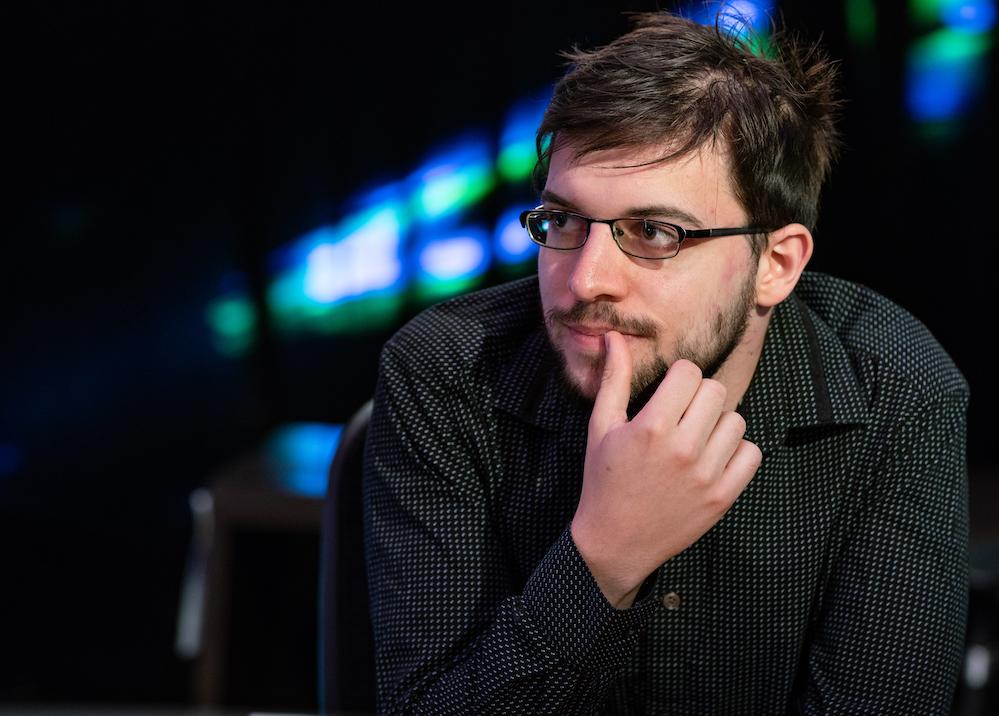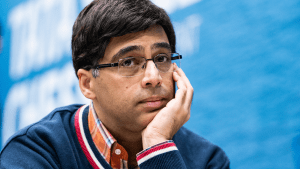
MVL Interview: 'Clock Ticking On World Championship'
Maxime Vachier-Lagrave tells David Cox about his chess origins, the state of elite chess and his world championship ambitions.
2019 is all about unfinished business for Maxime Vachier-Lagrave. Known for his sharp, tactical style, the Frenchman is one of the finest attacking players in chess, but despite being a fixture in the world’s elite since 2013, Vachier-Lagrave has yet to challenge Magnus Carlsen’s world championship.
MVL has yet to even reach the Candidates' tournament, missing out in excruciating fashion in 2017 when he narrowly failed to qualify in the Grand Prix, World Cup, and rating categories.
Vachier-Lagrave will be determined to put things right in 2019.
Interview text may have been edited for clarity or length.
Chess.com: When did you first know you had an aptitude for chess?
Maxime Vachier-Lagrave: My father took me to a local club when I was six, and I didn’t know it then, but that’s where I was detected as a talent. That year I played my first three tournaments, and I ended up becoming French champion in my age group, which made me realize I had potential to be a decent player. The main thing I remember though, is that I was always getting accused of playing too fast. At the French championships we had one hour each on the clock, and I finished some games in five minutes. But that’s what kids do. As a six-year-old, one hour felt like a lifetime!
Little by little, people managed to convince me that making use of all your time is kind of useful.
What was it that you liked most about the game?
At some point with chess, you understand you never finish learning. It’s an unlimited process for humans. That appealed to me. And when you win, you’re sort of proving a point to your opponent and to other people. That feels nice, especially as a kid. It still feels nice today when it happens!

When you were growing up, in the 1990s and 2000s, French chess was on an upward trend. Why do you think that was?
Around the time I was born, a lot of grandmasters from the dying Soviet Union started to move abroad in search of a better future, and France was one of the attractive options I guess. They began coaching at different clubs, which gave many young players the opportunity to work with these strong trainers. There was a Bulgarian grandmaster called Nikola Spiridonov who was basically a bit of a legend. We worked together for around four years, and he taught me the Grunfeld and endgames so he had a definite impact on my chess.
To this day, endgames are still one of my strong suits, either holding when I’m worse, or keeping the pressure on when I have chances.
You were unusual for an elite chess player, in that you went to university, and turned professional a bit later, in your early 20s. Was it ever a problem, balancing your chess career with the urge to party with friends?
My urge for parties actually started a bit later, when I was 22, 23, a full-time professional and already closing in on the top 20. I got to understand, what we might describe as "the Frenchman’s call" a bit more. As a professional player, I got to see the other top French players more often, who were already partying quite a lot. But I don’t think it ever hindered my chess. It’s important for feel good, relax, and think about something else for a while. I also enjoy doing that through sport. I like to play tennis, table tennis, and even football, even though I am particularly horrible at it.
You sometimes joke on Twitter about the fact that you’re lazy. Can you tell us more about that?
I’ve always had this problem of pushing things right until the last minute. For example, before my first World Cup in 2009, I didn’t do any preparation before arriving at the venue, and I suffered quite a lot in my opening two matches. My problem is that I didn’t have to work really hard to get to a certain level, and now it’s hard to change that.
The times when I’ve worked hardest on chess have only been when I’ve felt there’s an emergency; for example, in 2015 when I had been playing the elite for a year, but realized I wasn’t really managing to annoy them. I had a period that year where I didn’t win in 30 matches, and my rating tumbled from 2770 to 2720. Another time was back in 2008, when I broke 2700 for the first time, and all the grandmasters rated 2500-2600 began playing much more cautiously against me. Suddenly I wasn’t beating them as often, and it took me time to sort it out.
What do you think is the main difference between the elite and those grandmasters ranked outside the top 50 and top 100?
The big thing is the depth of opening preparation. When you’re rated 2500, you don’t need that. If you are preparing like a 2800 player, it’s not going to be useless; it’ll get you wins, but you’re missing the entire point. You have to improve in other areas, before such preparation is critical. When it comes to the elite, people don’t realize it, but the amount of lines we have to learn just to get a game with White is huge. I’m not even talking an advantage, just a chance to fight with your opponent.
It’s one of the main issues we have these days. But some players are better than that this others, like Fabiano Caruana, whose preparation is particularly good these days. Even Magnus, in his own ways, always manages to get a game where he can fight on his own terms.
Give us an idea of the amount of memorization you have to do.
We all have these deep files, which contain everything you’ve worked on. And for any line, they can contain between 3,000 and 6,000 moves, sometimes even more. And this is the case for every single line in an opening like the Sicilian Najdorf. It can be a long list, especially if you want a variety of backup ideas to surprise your opponent. Of course, you don’t have to remember every single move in these files, but many of the positions and how to get there.
You mentioned Fabiano’s preparation. How much did that contribute to his superb 2018?
Fabiano has been improving a lot. His openings are still very scary, which has always been the case. He’s playing at an exceptional level right now, but I must say, I’ve yet to have the same feeling of being totally outplayed by him or watching other people being outplayed by him, as was the case with Magnus back in 2012-2014. He’s not as dominant as Magnus was; the only time he’s got close to that was at the Sinquefield Cup in 2014 [when Caruana won his first seven matches], and that was quite something.

What made Magnus so good during that period from 2012-2014 and why has he not been quite so dominant since then?
He was relentless. Constantly putting the pressure on, and not giving any respite to his opponents. It lasted for a while, and then we learnt how to defend against that. We analysed what he was doing right, learnt from it, and step by step, managed to close the gap. Maybe that’s the reason he’s not so dominant anymore. He’s still the best player in the world so we didn’t close it completely, but that’s probably because that style of playing always came so naturally to him.
You were ranked number two in the world, back in 2016. Do you think you can ever challenge Magnus for the world title?
It’s very important for me to qualify for the next Candidates'. If I don’t, I’ll be 32 by the time the 2022 Candidates' come around. That’s already a bit late to be making your Candidates' debut, given that to achieve my dream I’d have to win it, and then win a world championship match. And experience is a crucial part of that, because these events are long, and the preparation is so unique.
If you make it to a world championship match, you’re watching your opponent for six months in advance, monitoring every move, and looking for any of his weaknesses. It’s very different to what we’re used to, and Magnus has so much experience at that now, that it’s very hard for someone playing their first match against him, to close that gap.

How big of a disappointment was it for you to not qualify for the 2018 Candidates', given how close you came?
Ultimately, a few small mistakes cost me big. It was a big disappointment because it was my main focus for the year. I felt the Grand Prix was my most realistic chance to qualify, but I didn’t actually win enough games. But the (2017) World Cup was the event which had the most profound psychological impact on me.
When you get to the semifinals [where Vachier-Lagrave lost to Levon Aronian], you kind of expect to qualify. Maybe I need to work more on how I handle the decisive moments in future. It was hard to miss out on the Candidates', because as I said, experience is so important in an event like that, and even if I qualify for 2020, I don’t necessarily expect to win it on debut. So it was definitely a setback for me, but hopefully only a temporary one.
Do you feel the time pressure for you to make it to a world championship match in the next few years?
The clock is ticking. Chess is getting younger and younger, and other players are coming up. They’re probably 18, 19 right now, but in six years they could be top players. Of course there are players like Vishy Anand who still perform admirably at 50, but they are an exception.
You can expect your career to be more or less over by the age of 40. Even at 36, 38, it’s very hard to be fighting for the world title. I need to find a way to make that extra step, and get through the Candidates'.
Why do you think there is that age limit of 40?
Physical exhaustion is a big factor. Basically, chess is a game of focus. If you stop focusing on one move in one game, this one move will cost you a lot. And memory is also important. As you get older, it’s easier to make mistakes in move orders or simply to forget a line.
You could see things like this affecting Vladimir Kramnik in the past few years. You could feel that he couldn’t maintain the same level throughout a tournament. He couldn’t keep the same amount of energy and focus on each of his moves, and that’s why he had his oversights. Not because his brain had stopped working, but because at times, his body needed rest, it couldn’t handle the physical and mental tension anymore. [Kramnik retired from professional chess in January.]






